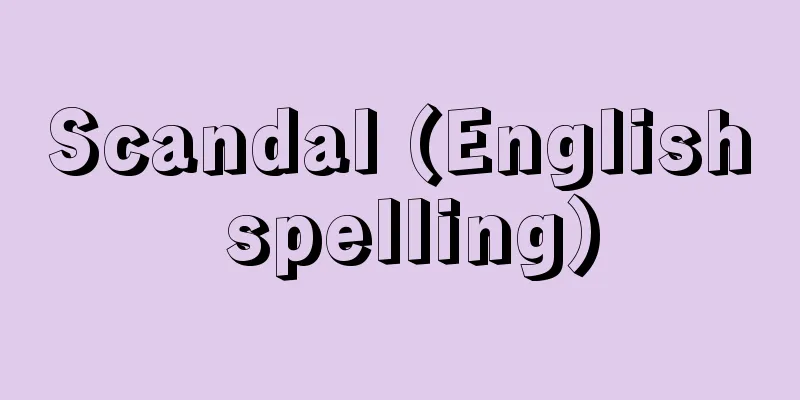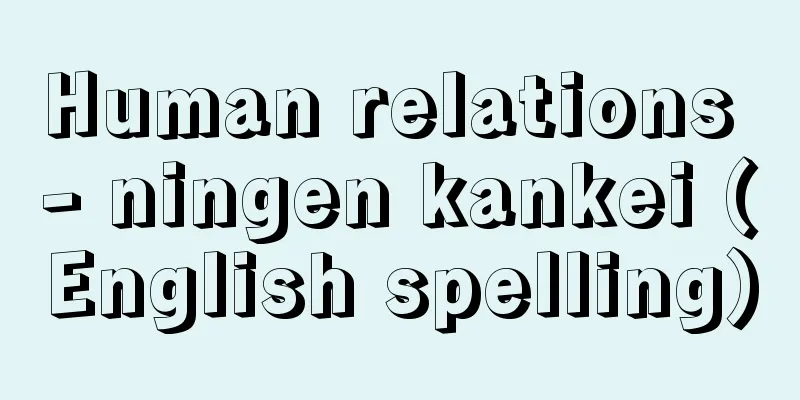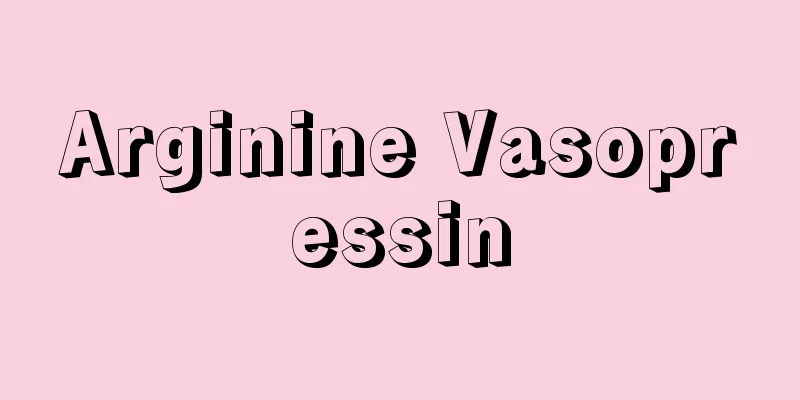Scandal (English spelling)

|
Originally, it meant a court case where it was difficult to determine whether the defendant was guilty or not guilty. The source is from the ancient Chinese book "Jia Yi Xinshu" which says, "In the past, there were cases of corruption in the Liang Dynasty, and they were considered half guilty and half not guilty." In Japan, the Heian period law commentary book "Ryo no Gige" (Law and Orders for Prison) states, "In many countries, there are cases of corruption (cases where there is doubt and it is difficult to determine the cause), and if the case is not resolved, the Ministry of Justice will take action." By extension, it was mainly used to mean a large-scale bribery case that became a political issue before and for a while after the Second World War, but it is not used much nowadays. Since the Meiji era, Japanese capitalism has been nurtured mainly through the collusion of privileged political businessmen with government power and the generous protection of political businessmen. Therefore, in the early days, there were many dark suspicions about political businessmen and power, such as the Yamashiroya scandal, the Mitani Sankuro scandal, the Osarizawa copper mine issue, the Fujita-gumi counterfeit banknote scandal, the Hokkaido Development Agency's public property transfer scandal, and the "Umibozu (Mitsubishi) Extermination" (the Mitsui Zaibatsu and the Liberal Party criticized and attacked Mitsubishi for its rapid expansion in the early Meiji era, which was the result of the ties between Iwasaki Yataro, the founder of the Mitsubishi Zaibatsu, and Okuma Shigenobu of the Constitutional Reform Party, comparing Mitsubishi to an umibozu and Okuma to an okuma). However, for these to constitute scandals, there had to be public opinion to expose and condemn them, and a self-cleaning mechanism had to be established. It was not until 1902 (Meiji 35) that the "Textbook Scandal", a nationwide corruption scandal surrounding the sale of textbooks, was uncovered, and in 1910 the "Nitto Scandal" was brought. In the Nitto Scandal, the prosecutor's office arrested over 20 Diet members, and this is said to be the first case in which the "prosecuting bureaucracy", who were relatively independent from the clan-based government, were able to exercise their own prosecutorial powers. The Siemens Scandal (Vickers Scandal) in 1914 (Taisho 3) was Japan's first international corruption scandal, involving commissions (fees, bribes) surrounding the ordering of equipment and warships by high-ranking Imperial Navy officials. As a result, the Yamamoto Gonbei cabinet resigned en masse. Other scandals that toppled cabinets include the Teijin Scandal (1934), which toppled the Saito Makoto Cabinet before World War II, and the Showa Denko Scandal (1948), which toppled the Ashida Hitoshi Cabinet after the war. The Showa Denko Scandal, the Shipbuilding Scandal (1954), and the Lockheed Scandal (1976) are said to be the three major scandals of the postwar Showa era or the postwar period. The Showa Denko Scandal was a corruption case involving policy loans from the Reconstruction Finance Bank, which was established with the aim of reviving Japan's industries after the war, which had been reduced to ashes. The Shipbuilding Scandal was a bribery case surrounding the passage of the revised Planned Shipbuilding and Shipbuilding Interest Subsidy Law. Both are typical of postwar scandals closely related to the investment and financing of state funds. However, since the Yoshida Shigeru Cabinet's exercise of its command authority prevented the prosecutorial investigation of the Shipbuilding Scandal, there have been almost no political heavyweights convicted for corruption in Japan. The only exception was the Lockheed scandal, in which this wall of structural corruption was broken down by evidence and testimony from the United States in the form of corporate audit testimony before the U.S. Congress. From the late 1980s to the early 1990s, when the Showa era turned into the Heisei era, the so-called bubble economy collapsed due to mismanagement of fiscal policies. Since then, Japanese society has changed and changed significantly, and the word "sinbu" (graft), which has a solemn and archaic feel derived from Chinese classics, has become almost obsolete. This does not necessarily mean that the substance of sinbu has disappeared. Rather, it is a result of the institutional fatigue of the entire Japanese national organization, with no real change of government for half a century, and there is a concern that we are falling into a decadent society where a system of structural corruption has taken root and political and administrative corruption has become commonplace, where even large-scale bribery cases are not politicized, and where a climate of "moral hazard" (lack of morality) where there is no awareness of sinbu. One example is the shocking decline in morale, corruption and misconduct among police officers, who should be on the front lines of the administrative and judicial functions of state power, which has been occurring nationwide since around 1999. Also, in the Defense Agency (now the Ministry of Defense), which bears the heavy responsibility of national defense, the Defense Agency itself systematically concealed evidence of the misconduct of the head of the Defense Facilities Agency, escalating to the point where the Director General of the Defense Agency resigned in disgrace, bringing moral hazard to its climax. Looking back at the past, the two major corruption scandals of the bubble era were the "Recruit Scandal" (1988-89), in which over 70 people from the powerful and privileged class, including a former prime minister, were implicated in an alleged bribery case involving unlisted stocks that were bound to rise in value, and the "Construction Company Corruption Scandal" (1993-94), in which the heads of major construction companies that contracted for public works were arrested on the bribery side, and the then Minister of Construction, two prefectural governors, and one designated city mayor on the bribery side.Although these scandals should have been thoroughly investigated as "corruption scandals" and a chance to settle the postwar structural corruption system, they were ultimately brought to a premature end due to incomplete investigations. The global waves of democratization and liberalization that were occurring at the time also brought a financial big bang to Japan, which had maintained a unique and lame financial and fiscal system under the overprotective financial convoy system of the former Ministry of Finance. This brought to light countless scandals perpetrated by bureaucrats and corporate MOF officials (named after the initials of the Ministry of Finance in English), such as excessive entertainment due to collusion and close ties between Japanese financial institutions and the former Ministry of Finance and the Bank of Japan government, which had been covering up huge amounts of bad loans for many years. Financial scandals and the problem of "money in politics" seemed as if they would be resolved with the change of government and the fall of the Liberal Democratic Party in 2009. However, even after the Democratic Party came to power, various problems have come to light, such as the issue of Prime Minister Yukio Hatoyama's fake donations, and it is difficult to say that the roots of the corruption have been eradicated. [Tetsuro Murofushi and Jin Igarashi] "Introduction to Corruption Studies, by Murofushi Tetsuro (1976, Pep Publishing)" ▽ "A 100-Year History of Corruption, edited by Matsumoto Seicho (1977, Yomiuri Shimbun)" ▽ "The True Story of Corruption in the Showa Period, by Murofushi Tetsuro (1989, Kanbunsha)" ▽ "Murojo Tetsuro's Explorations into Corruption around the World, by Murofushi Tetsuro (1996, Sanshusha)" ▽ "Break Down the Walls and Move Forward: A Personal Account of the Lockheed Scandal, Volumes 1 and 2 (1999, Kodansha)" by Hotta Chikara [References] | | | | | | | | | | | | |Source: Shogakukan Encyclopedia Nipponica About Encyclopedia Nipponica Information | Legend |
|
本来は、疑わしくて有罪か無罪か判決しにくい裁判事件をいう。出典は、古い中国の『賈誼(かぎ)新書』に「梁(りょう)かつて疑獄あり、半(なか)ば以(もっ)て罪に当ると為(な)す、半ば以て当らずと為す」とあり、日本では、平安朝の法律解説書『令義解(りょうのぎげ)』獄令に「およそ国に『疑獄』(獄疑うところあり処断明らめ難きものなり)あり、決せざれば刑部省(ぎょうぶしょう)に讞(はか)る」とあるによる。転じて、第二次世界大戦前および戦後しばらくは主として、政治問題化した大掛りな贈収賄事件という意味に使われていたが、現在ではあまり使われなくなった。 明治以降、日本の資本主義はもっぱら、特権政商資本の政府権力への癒着と政商の手厚い保護のもとに育成された。そのため創成期には、山城屋(やましろや)事件、三谷三九郎(みたにさんくろう)事件、尾去沢(おさりざわ)銅山問題、藤田組贋札事件、開拓使官有物払下げ事件、「海坊主(三菱(みつびし))退治」(三菱財閥の創始者である岩崎弥太郎と立憲改進党の大隈重信との結び付きによる明治初期における三菱の急膨張を、三井財閥や自由党が三菱を海坊主、大隈を大熊になぞらえて非難攻撃した)など政商と権力の黒い疑惑が問題になった。しかし、それらが疑獄を構成するには、これを摘発弾劾する民意世論と自浄機構の整備をまたなければならなかった。 1902年(明治35)に至ってようやく、教科書売り込みをめぐる全国的な汚職事件「教科書疑獄」が摘発され、1910年には「日糖疑獄」が立件された。日糖疑獄では、検事局が代議士20余人を検挙したが、これは、藩閥政府から相対的に独立した「検察官僚」が独自の検察権を行使しえた最初の事件といわれる。1914年(大正3)のシーメンス事件(ビッカース事件)は、帝国海軍高官の器材、軍艦の発注をめぐるコミッション(手数料、賄賂(わいろ))に絡む、日本初の国際疑獄事件であった。この結果、山本権兵衛(ごんべえ)内閣は総辞職した。このほか、内閣を倒した疑獄事件は、第二次世界大戦前では、斎藤実(まこと)内閣を崩壊させた帝人事件(1934)、戦後では、芦田均(あしだひとし)内閣をつぶした昭電疑獄事件(1948)がある。この昭電疑獄と造船疑獄(1954)、ロッキード事件(1976)は、戦後昭和あるいは第二次世界大戦後の三大疑獄といわれる。昭電疑獄は、敗戦で焦土と化した日本の産業復興を目的として生まれた復興金融金庫の政策融資に絡んだ汚職事件であり、造船疑獄は、計画造船および造船利子補給法改正案の成立をめぐる贈収賄事件で、いずれも国家資金の投融資に関係の深い戦後疑獄の典型といえる。しかし、造船疑獄の検察権による追及が、吉田茂内閣の指揮権発動によって阻止されて以降、日本では疑獄事件で断罪される政界の大物はほとんどいなくなった。唯一の例外は、この構造汚職体制の壁を、アメリカ議会での企業監査上の証言という形で、アメリカからの証拠・証言によって打ち破ったロッキード事件であった。 昭和期から平成期に移る1980年代末から90年代初頭にかけて、財政政策の失政によるいわゆるバブル経済崩壊以降、日本社会は大きく変貌(へんぼう)、変質し、中国の古典に由来するいかめしく古い語感をもつ「疑獄」ということばはむしろ死語に近くなった。このことは、かならずしも疑獄の実質がなくなったという意味ではない。むしろそれは、半世紀もの間における、実質的な政権交代が絶無という日本の国家組織全体の制度疲労の結果として、構造汚職体制の定着とともに、政治、行政腐敗の日常化が進行し、大掛りな贈収賄事件でさえ政治問題化せず、疑獄という認識すらない「モラル・ハザード」(道徳観の欠如)の風潮が瀰漫(びまん)する堕落退廃した社会に陥っているのではないかとの危惧(きぐ)も指摘されるのである。 その一例が、1999年(平成11)ころから全国的に続発する本来国家権力の行政作用と司法作用の第一線であるべき警察官の、驚くべき士気退廃や汚職、不正行為である。また、国家防衛の重責を担う防衛庁(現防衛省)による防衛庁背任汚職事件(1998)では、防衛施設庁トップの背任汚職を防衛庁自身が組織的な証拠隠しを行い、防衛庁長官の引責辞任にまで発展し、モラル・ハザードもここに極まったという事件を起こしている。過去にさかのぼれば、元首相以下の権力特権階級七十数名が絡んだ値上り必至の未公開株をめぐる贈収賄容疑事件の「リクルート事件」(1988~89)や、贈賄側は公共事業請負の大手建設企業のトップの面々、収賄側は当時の建設大臣以下2県知事、1政令指定都市市長などが検挙された「ゼネコン汚職」(1993~94)というバブル期の二大疑獄事件も、本来は「疑獄事件」として徹底的な究明を敢行し、戦後構造汚職体制を清算すべき総決算のチャンスであったにもかかわらず、結局は不徹底な捜査で早々に幕引きとなった。 おりからのグローバルな民主化と自由化の波は、旧大蔵省の護送船団方式による金融過保護財政下での特異かつ跛行(はこう)的な金融財政体系を護持してきた日本にも、金融ビッグバンをもたらした。これにより、膨大な不良債権を長年糊塗(こと)してきた日本の金融機関と旧大蔵省、日銀行政の癒着やなれあいによる過剰接待など、官僚と企業のMOF担(大蔵省の英文表記Ministry of Financeの頭文字からこうよばれた)による無数のスキャンダルがとめどなく白日のもとにさらされたのであった。 金銭スキャンダルや「政治とカネ」の問題は、2009年の政権交代および自民党の下野によって解決されるかにみえた。しかし、民主党政権となってからも、鳩山由紀夫首相の偽装献金問題など、さまざまな問題が明るみに出ており、疑獄の根が根絶されたとは言いがたい。 [室伏哲郎・五十嵐仁] 『室伏哲郎著『汚職学入門』(1976・ペップ出版)』▽『松本清張編『疑獄100年史』(1977・読売新聞社)』▽『室伏哲郎著『実録昭和の疑獄史』(1989・剄文社)』▽『室伏哲郎著『室状哲郎の世界汚職探検』(1996・三修社)』▽『堀田力著『壁を破って進め――私記ロッキード事件』上下(1999・講談社)』 [参照項目] | | | | | | | | | | | | |出典 小学館 日本大百科全書(ニッポニカ)日本大百科全書(ニッポニカ)について 情報 | 凡例 |
Recommend
Foreign exchange debate
...These processes can also be divided into royal...
Exonerated - Menso
Under the Criminal Procedure Law, this is a judgm...
Drepanocladus fluitans (English spelling) Drepanocladusfluitans
...In Lake Inawashiro, the moss Jungermannia nipp...
Born, Max
Born: December 11, 1882 in Breslau (now Wrocław, P...
Corrida de toros (English spelling)
...It is also practiced in Portugal, France, and ...
Ganassi, S. (English spelling) GanassiS
…On the other hand, as a solo instrument, it bega...
Hosa Bunko - Hosa Bunko
This is a municipal library in Higashi-ku, Nagoya....
Chrysiptera hollisi (English spelling) Chrysipterahollisi
...They feed on fish, shellfish, shrimp, and othe...
Geb - Geb (English spelling)
A male god who appears in the ancient Egyptian cr...
United States - United States
[1] [noun] A single state formed by the union of t...
Abdullah (Kuwait) - Abdullah
...After Sheikh Mubarak ascended to the throne in...
Kohoku [town] - Kohoku
An old town on the northeast shore of Lake Biwa, H...
Ezo Magistrate - Ezobugyo
〘Noun〙 A title of a position in the Edo Shogunate....
Common channel signaling system
...This channel-associated signaling system is wi...
King, Cecil
…On the other hand, the achievements of modern sc...









